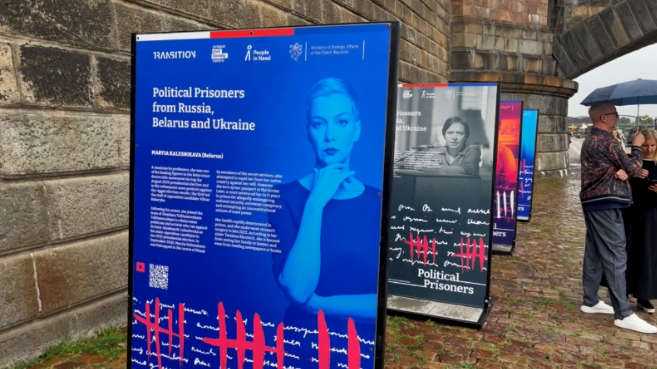In Russia and Belarus, political prisoners continue to face inhumane treatment. See their stories
Published: Jul 27, 2025 Reading time: 2 minutes Share: Share an articleMultiple political prisoners are still being held in prisons in Russia, Belarus and on occupied Ukrainian territories. Some have been freed recently, but the struggle remains. We co-organized an exhibition in Prague as a reminder.

See the exhibition in full in English here.
Nariman Dzhelyal was the deputy chairman of the Crimean Tatar parliament. In August 2021, he participated in the Crimea Platform summit in Kyiv – an international forum for cooperation between Ukraine and its allies.
Upon returning to Russian-occupied Crimea, he was arrested by the FSB, handcuffed, and held with a hood over his head. A local court under Russian control sentenced him to 17 years in prison for alleged sabotage. In 2024, he was released as part of a prisoner exchange between Russia and Ukraine.
“He is one of the few who managed to regain his freedom. And not only that – today, he serves as Ukraine’s ambassador to Turkey. We supported him in several ways, highlighting his case as part of our campaign. He is also a recipient of the Stories of Injustice Award, presented by the educational program One World in Schools,” said Karolína Kvačková, deputy director of the People in Need Centre for Human Rights.
Nariman’s story is one with a happy ending. Unfortunately, many others remain imprisoned under horrific conditions in Russia, Belarus, or in occupied Ukrainian territories.
One of them is Maryia Kalesnikava, a prominent figure in Belarus’s democratic opposition during the 2020 protests. She was sentenced by a Belarusian court to 11 years in prison, accused of threatening national security. While behind bars, her health deteriorated; she had to undergo stomach surgery. She is denied access to her lawyer and family and is not even allowed to read.
“These regimes will eventually disappear – the only question is when. It’s vital that it happens as soon as possible, not only for us but especially for those currently imprisoned. These repressive machines are so powerful and brutal that many will sadly never see freedom. They are dying in prisons under violence and psychological torment. That’s why we must realize this concerns us too – and that we have a responsibility to help,” said David Stulík, Special Envoy of the Czech Ministry of Foreign Affairs for the Eastern Partnership.
The exhibition was organized in cooperation with the Ministry of Foreign Affairs, People in Need, the Prague Civil Society Centre, and Gulag.cz.


